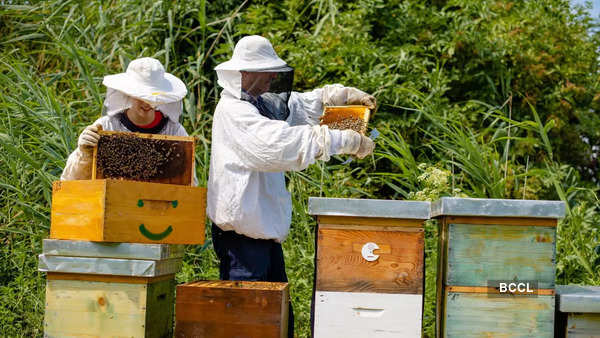The commercialization of beekeeping has taken a toll on the traditional and sustainable practices that were once prevalent.
Historically, beekeeping was primarily localized, and beekeepers followed practices that were in harmony with nature and their communities. However, the push for mass production and profit has led to the industrialization of beekeeping, where large-scale operations prioritize honey production and pollination services over the welfare of the bees and their natural habitats. Instead of being out in the wild, in their natural hives and colonies, the new age ‘bee-keepers’ are creating artificial environments to facilitate their profits.
Sam Knight, a staff writer at The New Yorker, in a conversation with Gareth John tried to understand traditional beekeeping. In The New Yorker, Sam writes – John grew up in the English countryside in the 1960s and 1970s, when beekeeping was—as he remembers it—a gentle, live-and-let-live pastime: Men in veils pottering around a few hives under the apple trees, jars of honey for sale at the garden gate. “It was very, very leave-alone… Natural,” he said.
A lot of traditional bee-keepers are now worried that the practices that are followed right now are not rooted in cultural and environmental understanding, and the ones that were, are fading away. The art of beekeeping, passed down through generations, involved a symbiotic relationship. People understood the needs and behaviors of the bees, allowing them to maintain healthy colonies without relying on excessive artificial interventions.
Modern commercial practices, on the other hand, often involve stress-inducing practices such as migratory beekeeping, where hives are transported long distances to pollinate various crops. This disrupts the bees’ natural rhythms and exposes them to different stressors.

Moreover, commercial beekeeping is contributing to the problem of mite infestations, such as Varroa destructors.
The Varroa mite is a parasitic pest that infests honey bee colonies and weakens the bees, making them more susceptible to other diseases. The intensive and crowded conditions of commercial apiaries provide an ideal environment for the spread and proliferation of these harmful mites.
While commercial beekeeping has led to overexploitation in a lot of regions, there are still some communities and groups that are making sure that the symbiotic relationship stays alive.
In India for example, Adivasis of the Nilgiris have kept the tradition alive and symbiotic. In the states of Tamil Nadu, Kerala and Karnataka reside 18 ethnic groups who hunt for honey on the cliffs of Nilgiris.
Similarly, many tribals and village men, residing up in the Himalayas (dominantly Himachal and Uttarakhand) cultivate fresh honey. In new initiatives, some people are also learning the art of beekeeping which is not harsh on the bees but still provides knowledge.
Carrot giants vs. small farmers: Legal battle over California’s precious water

